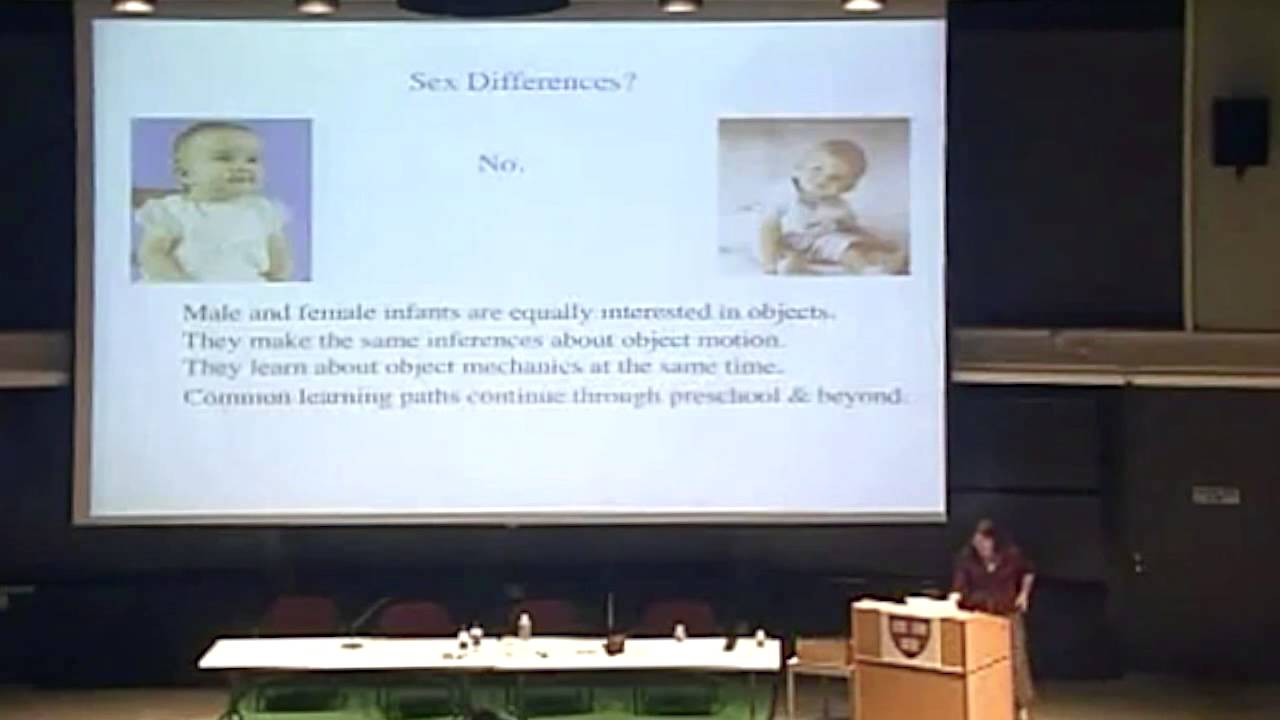Hear the Reasons
More info: http://www.edge.org/3rd_culture/debate05/debate05_index.html
NO COPYRIGHT INFRINGEMENT INTENDED
The point of this channel is to take talks that I find interesting, but that have poor audio and/or video quality, and trying to improve those factors.
If you find a video here that belongs to you and want it removed, just send a message to me on this page.
If you want to suggest a video for audio/video improvement, send me a message here, or on Twitter @hearthereasons
On April 22, 2005, Harvard University’s Mind/Brain/Behavior Initiative (MBB) held a defining debate on the public discussion that began on January 16th with the public comments by Lawrence Summers, president of Harvard, on sex differences between men and women and how they may relate to the careers of women in science. The debate at MBB, “The Gender of Gender and Science” was “on the research on mind, brain, and behavior that may be relevant to gender disparities in the sciences, including the studies of bias, discrimination and innate and acquired difference between the sexes”.
It’s interesting to note that since the controversy surrounding Summers’ remarks began, there has been an astonishing absence of discussion of the relevant science…you won’t find it in the hundreds and hundreds of articles in major newspapers; nor will find it in the Harvard faculty meetings where the president of the leading University in America was indicted for presenting controversial ideas.
Scientists debate continually, and reality is the check. They may have egos as large as those possessed by the iconic figures of the academic humanities, but they handle their hubris in a very different way. They can be moved by arguments, because they work in an empirical world of facts, a world based on reality. There are no fixed, unalterable positions. They are both the creators and the critics of their shared enterprise. Ideas come from them and they also criticize one another’s ideas.
Through the process of creativity and criticism and debates, they decide which ideas get weeded out and which become part of the consensus that leads to the next level of discovery.
But unlike just about anything else said about Summers’ remarks, the debate, “The Science of Gender and Science”, between Harvard psychology professors Steven Pinker and Elizabeth Spelke, focused on the relevant scientific literature. It was both interesting on facts but differing in interpretation.
Both presented scientific evidence with the realization and understanding that there was nothing obvious about how the data was to be interpreted. Their sharp scientific debate informed rather than detracted. And it showed how a leading University can still fulfill its role of providing a forum for free and open discussion on controversial subjects in a fair-minded way. It also had the added benefit that the participants knew what they were talking about.
Who won the debate? Make up your own mind. Watch the video, listen to the audio, read the text and check out the slide presentations.
There’s a lesson here: let’s get it right and when we do we will adjust our attitudes. That’s what science can do, and that’s what Edge offers by presenting Pinker vs. Spelke to a wide public audience.
Source



Spelke is very ineffective in countering Pinker's arguments. She fails to rebut his actual points, often making claims that would fail to rebut even if they are true. She also appears to have cherrypicked her data points (i.e. the two studies of early childhood she chose, that actually show girls performing better) even though she believes that both sexes perform equally at that age. Given this, It wouldn't surprise me if the claim below, that she materially misrepresented her sources, is true. If I wanted to see the single most compelling argument against there being a difference in mathematical aptitude between gifted men and gifted women, Where should I look?
A new study with sample size of one shows women are more likely to rely on non sequiturs.
Why are the people who ask the questions the end always so retarded?
1:00:00 surely this slide says it all. The complex task being "life" and the choices in how we solve it is through our choice of work. Women choose different paths than men, at almost every step – and thats fine.
She always go back to "feels"
Pinker is always so impressive. So eloquent, thorough, well read and genuine. He is a champion!
blistering moment at 1:43:49 ! This is the elite academic's gotcha moment. Pinker has an elegant retort and she just has to tacitly acknowledge the moment. A lovely debate overall.
Why is Pinker assuming a normal distribution for the traits? It seems the choice of mean and variance is based on the major body of data that is also near the mean — but there is not necessarily good confidence for the fit at the tails which is where he bases his arguments.
The phrase "turn me on" and the word "kids" were strung much too close together for comfort there.
In America right now 75% of all PhD's go to women and the 25% that go to men are, mostly I believe, in the sciences and that must be down to prejudice and discrimination!??!! When will "intellectuals" learn to stop being psychopaths and realise that individuals make choices in life for a reason. Why not check the applicants anyway, if there's an over representation of male applicants then there's no discrimination in the University and if there's any discrimination happening outside the Universities it is none of these people's business and they're out of their league. I don't think they have the right to start getting involved in how parents bring up their children since this is how the human race has become so successful in the first place and when the "intellectuals" get involved you get the horrors of the 20th century unfolding all over again because they can't see individual, flesh and blood, real human beings they dehumanize, they see the abstract, they see class, race, ethnicity, Nations, group statistics and demographics. They will sacrifice the lives of young men and women to have window dressing in the sciences. People go to University to become successful in the subject they love don't they? And then they spend over 90 years of the rest of their days outside the University hopefully using the skills they've learned so they can put food on the table doing something they enjoy and they've worked hard to understand. Who is more likely to mess that up here? The people who are claiming to be concerned surely. I've yet to meet a male or female who think's ''I'm achieving all this for my sex and gender'' No they do it for their own individual reasons don't they?
It's also worth pointing out that, maybe women are under represented in the sciences because female professors are telling them to ignore all scientific evidence in favour of Ideology. It's not like you can make a subjective mistake when marking papers here like you can in all other subjects. 2 + 2 either equals 4 or it doesn't. Pretty straight forward.
I couldn't watch the second speaker. She was using very extreme, black and white statements such as "everybody thinks" …everybody. really? You know what everybody thinks?
"X is better than Y" without having prefaced with the statistical meaning of "on average" as Pinker developed at the beginning of his talk. She came across as emotionally motivated and irrational to me.
29 feminazi fascists went thumbs down
Spelke: If I wave my hands and walk around enough, I can make you believe in unsubstantiated arguments.
Spelke's IQ can't be higher than 120, while I would guess Pinker's is in the 150's. This fight is a lightweight getting trounced by a heavyweight.
Pinker's hair is amazing.
I can’t believe we are still having these debates with people that believe there is no difference between men and women besides everything from the neck down. These feminist types are so biased it’s unbelievable. They will never accept that the arguments against their beliefs completely render them null and void. And we all have to continue to pander to them or else you hate women.
Women demanding to be given more high-status, high-paying science positions. You don't see many of them marching for more female plumbers, electricians or auto-mechanics. We can see through you, ladies.
My main issue with Pinkers lack of willingness to be truly inquisitive of what shapes gender beyond statistical differences considering the human brains plasticity and the rise of epigenetics
stating that men or or women are more likely to be drawn to certain professions does not necessarily mean that there is an innate or biological reason for the different outcomes.
it was not long ago it was suggested that Asians had lower IQ than Caucasians based on the same presumption that statistical differences were a proof of said theory
44:45 cute SJW bs
Thanks for uploading this version. The one Harvard uploaded is nearly impossible to hear. I can’t believe such a prestigious school doesn’t have a proper audio/video engineer.
She had no answer at all to Steven's last point about female representation in less concretely objective fields like psychology & sociology. If the problem was the subjectivity of choices, thus allowing the unconscious bias that she seems to suggest secretly rules the world then the results would be the opposite of what she suggests. Slam dunk for Dr. Pinker.
I have a question.
Is there an inherent superiority amongst men at oppressing the opposite sex? If so where does that superiority come from?
Check mate.
Thank the flying spaghetti monster for steven pinker.
So two psychologists are lecturing us on the bridge between biology and concepts. Ok. Why can't we invite a biologist or two?
She started from the beginning, simple and brilliant. Sorry dude.
This video proves men are more logical than women.
"It has been estimated that tens of thousands of people were executed for witchcraft in Europe and the American colonies over several hundred years. Although it is not possible to ascertain the exact number, modern scholars estimate around 40,000–50,000."
Not millions, toots. However, compare that (and any other number of women) to the number of men put to death from war and other offenses and you'll find there's no comparison.
Spelke: Speculates about possible bias, bias, more bias, possible discrimination… unconscious bias…
Pinker: Gives wide-ranging evidence for his views.
The women who commented starting @ 1: 48:02 ended by saying that "Women are not permitted to move around or express their sexuality" because of "social mores". LMFAO!!!
In America?
In the 21st century?
One thing bugs me: The argument at 25:21 about the predictive power about the SAT seems like a reversed causality to me. Most of those long term "successes" should be more likely for people scoring in the high end of the tests because they allow admission to the top end universities. People with low SAT scores will just not be accepted to e.g. prestigious science programs. Am I missing something?
1:27:55
Pinker essentially destroys Spelke and tells her in a very civilised manner that she has no idea what statistical significance means. She never replied to Pinker criticism. Furthermore, Pinker is referring to huge meta studies and data sets like the population of Scotland whereas Spelke is saying “I think”.
And her blabber about SAT being rigged is just embarrassing. How on earth did she become professor of anything …
I checked just out of curiosity how the best female chess player in the world stands in rankings. Hou Yifan #87 among active players and #93 among all players. She is the only one in top 100, the next one is #292/330 respectively. Five top juniors are better than the best female player in the world. Here were are looking at talent, that is several standard deviations out to the right on a normal distribution.
1:27:00 Open conversation begins.
I could follow Pinker's arguments easily. He drew straight lines between multiple pieces of evidence and his conclusions. I don't think Spelke connected the data she presented to her position very well. Many of the studies she brought up seemed weakly correlated to her conclusions, or unrelated or even contradictory to her position. Some of her interpretations seemed like outright dishonest misrepresentations made to support her claims. I want to give her the benefit of the doubt, but I struggle to do so. If anything, the debate swung me further from Spelke's view then when I started the video.
I know I m about to say something stupid but someone should give good advice to so many clever scientists about their hairstyle
its somehow sad that scientist are forced to debate a thing which was simply obvious before the third feminist wave
I don't think that competing with men is the be-all and end-all of Women's Liberation. We need a more cooperative, compassionate society which values all the different talents that people have and tries to put them to good use for the benefit of everyone. When I was younger, I was considered smarter than almost all the men around me and most of them agreed with the assessment. When I got into college, I was in the middle of a dog eat dog situation where I had to choose between changing society and "bettering" myself. Fortunately, I was betrayed by some of my "friends" and it didn't work out. It bothered me for years but I'm very grateful for it now. I'm writing a book on Voluntary Simplicity which I hope will benefit women, men, and especially, their children. If the publishers won't take it, I can give it away online or through a non-profit. I wouldn't trade my life for a position in the Math Department of Harvard for a million dollars.
34:12 he also committed suicide several years after that marriage, and remained very angry and feeling victimized by his doctor throughout his life…
“We agree that both our society in general and our universities in particular are going to be healthiest if all opinions can be put on the table and debated on their merits. We also agree that claims concerning sex differences are empirical. They should be evaluated by evidence and we’ll all be a lot happier and live a lot longer if we can try to undertake that evaluation as dispassionately and rationally as possible. We agree that the mind is not a blank slate.” – Elizabeth Spelke, 2005
How things have changed in 14 years…
Hate to throw stereotypes ironically at this debate, but she does seem overly emotional
She appeared much more emotional and lacked references
1:45:16 tone is patronising stopped listening
1:53:08 what! Is she serious?
Spelke fell apart towards the end